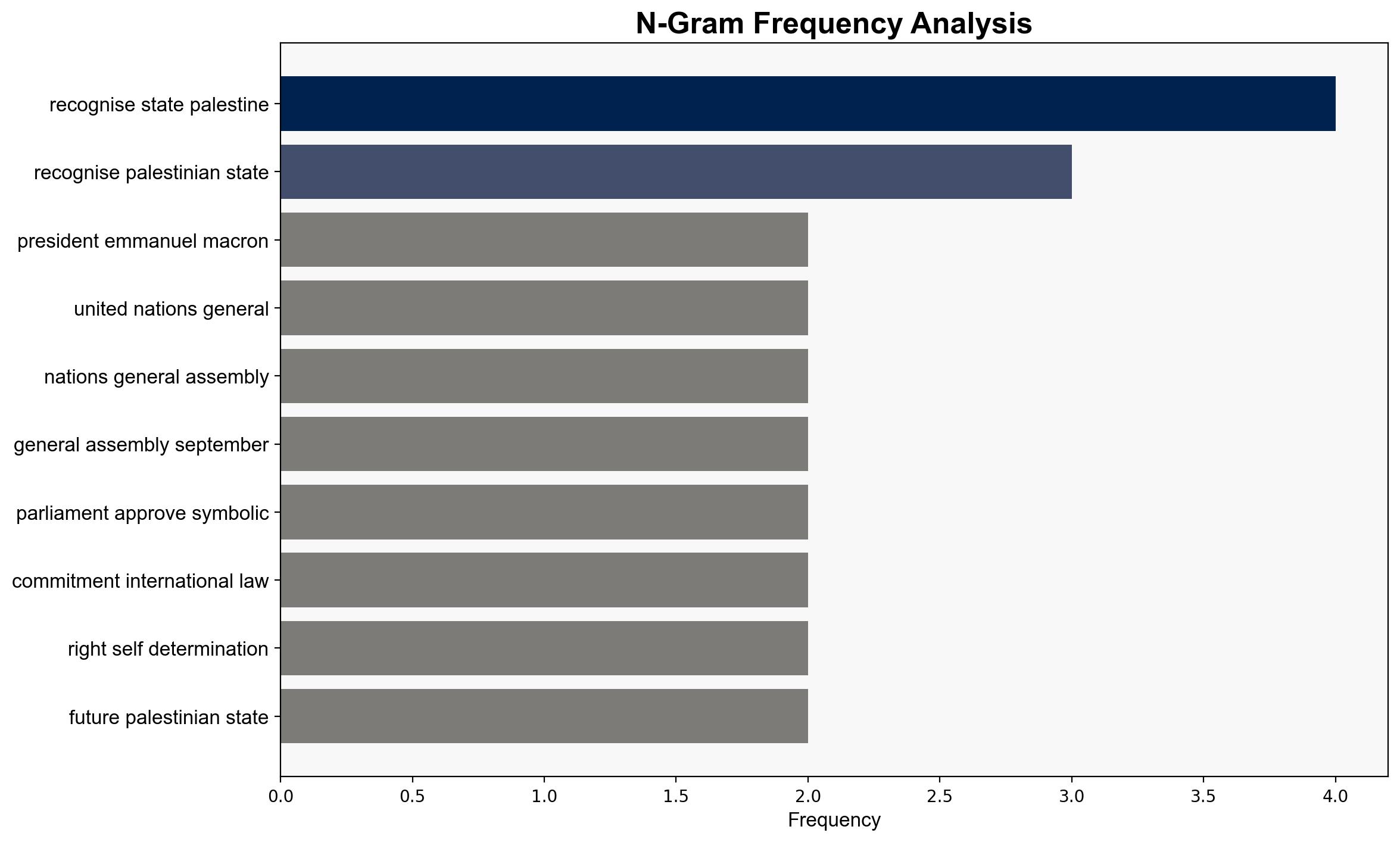Macron says France will recognise Palestinian state in September – Al Jazeera English
Published on: 2025-07-24
Intelligence Report: Macron says France will recognise Palestinian state in September – Al Jazeera English
1. BLUF (Bottom Line Up Front)
France’s decision to recognize a Palestinian state at the UN General Assembly in September is a significant geopolitical move with potential to alter European and Middle Eastern dynamics. The most supported hypothesis is that France aims to leverage its influence to catalyze peace negotiations and assert its leadership within the EU. Confidence level: Moderate. Recommended action: Monitor diplomatic responses from key stakeholders, particularly Israel, the United States, and other EU nations, to anticipate shifts in alliances and policy adjustments.
2. Competing Hypotheses
1. **Hypothesis A**: France’s recognition of Palestine is primarily a strategic move to enhance its diplomatic influence in the Middle East and within the European Union. By taking a lead role, France seeks to position itself as a key mediator in the Israeli-Palestinian conflict, potentially filling a perceived leadership vacuum left by other Western powers.
2. **Hypothesis B**: The recognition is largely symbolic, aimed at appeasing domestic and international audiences critical of Israel’s actions in Gaza. This move may not translate into substantial policy changes or shifts in the geopolitical landscape but serves to align France with international law and human rights advocacy.
Using ACH 2.0, Hypothesis A is better supported due to France’s historical involvement in Middle Eastern diplomacy and recent actions indicating a desire to assert more influence in international affairs.
3. Key Assumptions and Red Flags
– **Assumptions**: Hypothesis A assumes France’s recognition will lead to increased diplomatic leverage. Hypothesis B assumes symbolic gestures suffice to influence international opinion.
– **Red Flags**: Lack of clear support from other major EU countries like Germany could undermine France’s position. The absence of a coordinated EU response may signal internal divisions.
– **Blind Spots**: Potential backlash from Israel and its allies, which could lead to diplomatic isolation or economic repercussions for France.
4. Implications and Strategic Risks
– **Geopolitical**: France’s move could strain relations with Israel and its allies, potentially impacting trade and security cooperation.
– **Economic**: Possible economic sanctions or reduced cooperation from countries opposing the recognition.
– **Psychological**: Increased tensions in the region may lead to heightened security concerns and potential for escalated conflict.
5. Recommendations and Outlook
- Engage in diplomatic dialogue with EU partners to ensure a unified stance and mitigate potential divisions.
- Prepare for potential retaliatory measures from Israel and its allies by assessing economic and security dependencies.
- Scenario Projections:
- Best: France’s recognition leads to renewed peace talks and EU cohesion.
- Worst: Diplomatic fallout with Israel and allies leads to economic and security challenges.
- Most Likely: Incremental diplomatic shifts with limited immediate impact on the ground.
6. Key Individuals and Entities
– Emmanuel Macron
– Mahmoud Abbas
– Hussein al-Sheikh
– Keir Starmer
– Yasser Arafat (historical reference)
7. Thematic Tags
national security threats, geopolitical strategy, Middle East diplomacy, European Union policy




